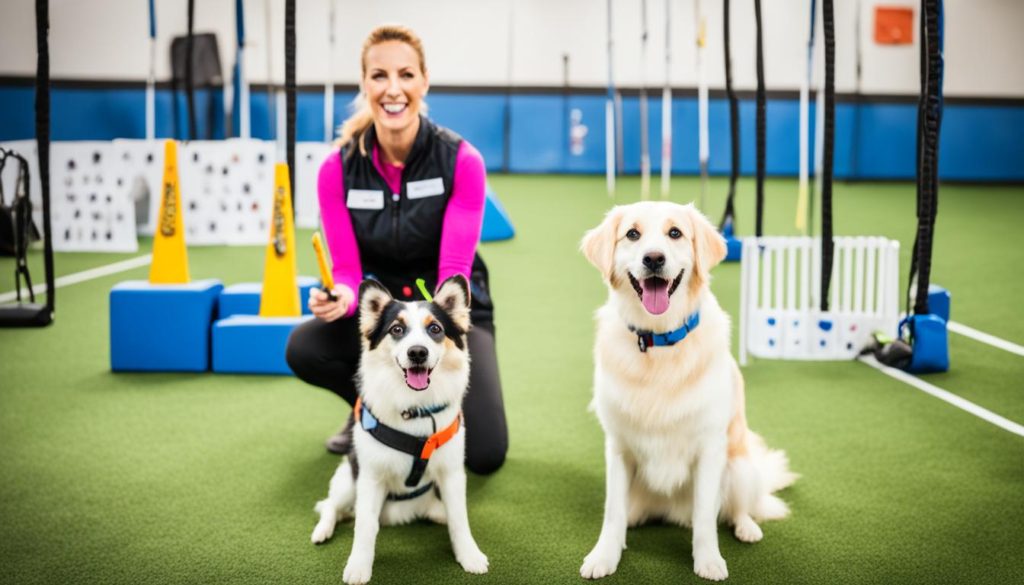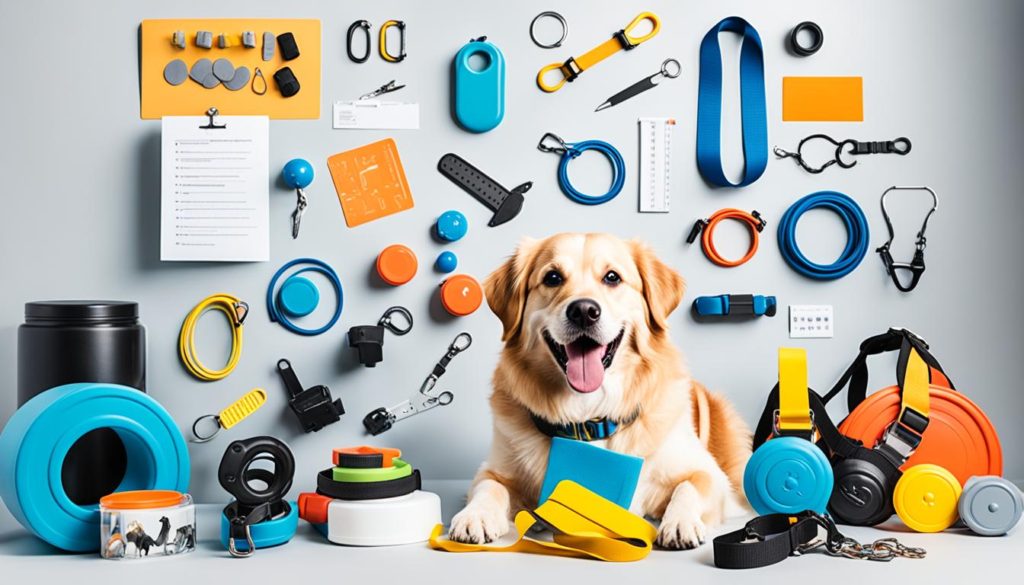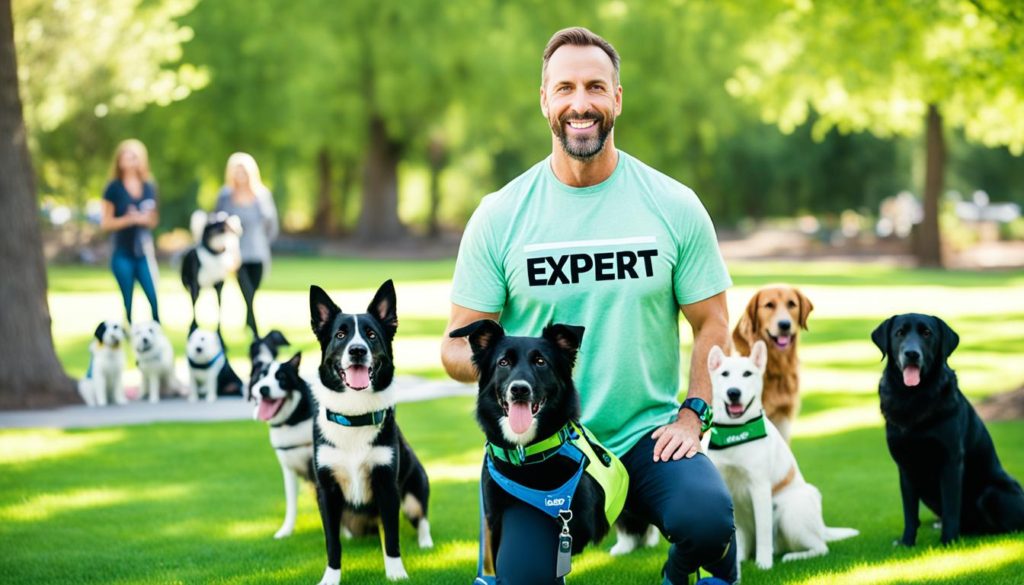Dog training is an essential part of owning a dog, whether you are a new dog owner or have years of experience. However, it’s important to find the right dog trainer who suits your needs and training philosophy. This section will provide guidance on what to look for in a dog trainer, including their methods, services offered, and qualifications.
When it comes to finding the best dog trainer, there are several factors to consider. You want a trainer who is not only experienced and certified but also someone who understands your dog’s unique needs. Look for a professional dog trainer who has a proven track record of success and can provide reliable and top-rated dog training services.
Whether you need help with dog obedience training, puppy training, or advanced dog training, choosing the right trainer is crucial. A dog training expert with a comprehensive understanding of canine behavior and positive reinforcement techniques can make a significant difference in your dog’s training journey.
Key Takeaways:
- Look for a certified and experienced dog trainer.
- Choose a trainer who uses positive reinforcement techniques.
- Consider the specific needs of your dog, whether it’s obedience training or addressing problem behaviors.
- Ask about the trainer’s qualifications, education, and credentials.
- Ensure the trainer emphasizes the importance of the dog-human relationship and involves the whole family in the training process.
What to Look for in a Dog Trainer
When searching for a dog trainer, it’s crucial to consider their training methods and philosophy. Look for a trainer who uses positive reinforcement training techniques, which involve rewarding the dog for appropriate behavior and teaching alternative behaviors. This type of training creates a positive and enjoyable learning experience for your dog, strengthening the dog-owner bond and fostering a cooperative relationship.
Assess the specific needs of your dog, whether it’s addressing problem behavior or providing basic obedience training. Some trainers offer group classes for socialization, allowing your dog to interact with other dogs and learn in a group setting. Others focus on private training sessions, providing more personalized attention and addressing individual needs. Consider what will work best for your dog’s learning style and behavior.
If your dog has specific issues or problem behaviors, such as aggression or separation anxiety, look for a trainer who specializes in behavior modification. They will have the expertise to assess and address these challenges effectively.
“Positive reinforcement training involves rewarding the dog for appropriate behavior and teaching alternative behaviors.”
Here’s a comparison of group classes and private training:
| Group Classes | Private Training |
|---|---|
| Great for socialization | Individual attention |
| Opportunity to learn from other dogs | Customized training plan |
| Lower cost per session | Focused on specific needs |
Remember, a well-qualified trainer will have experience and knowledge in positive reinforcement training, understand dog behavior and body language, and have effective teaching techniques for both dogs and owners.
https://www.youtube.com/watch?v=kqV4PQNJ8lI
By choosing a dog trainer who uses positive reinforcement and addresses your dog’s specific needs, you’ll lay the foundation for a well-behaved and happy canine companion.
What to Ask a Potential Dog Trainer
To ensure you choose the right dog trainer for your furry friend, it’s essential to ask the right questions. By gathering information about their education, credentials, and training methods, you can make an informed decision. Look for trainers who have a comprehensive understanding of dog behavior, communication, and the importance of socialization. Additionally, observing a training class and asking for references can provide you with valuable insights into their expertise and success rate.
When interviewing potential dog trainers, consider the following:
- Education and Credentials: Inquire about their educational background and any relevant certifications they hold. A well-qualified trainer should have a solid foundation in dog training techniques and principles.
- Training Methods: Ask them to describe their approach to training. Positive reinforcement is a highly effective method that rewards desired behavior, resulting in a more rewarding training experience for both you and your dog.
- References: Request references from previous clients. Speaking with others who have worked with the trainer can give you insights into their training style, professionalism, and the success of their training programs.
- Understanding of Dog Behavior: A good trainer should have a deep understanding of dog behavior, including how they communicate and interact with humans and other dogs. This knowledge is crucial for addressing behavioral issues effectively.
- Emphasis on Socialization: Socialization is key to raising a well-rounded and well-behaved dog. Ask how the trainer incorporates socialization into their training programs and what opportunities they provide for interaction with other dogs.
Remember, finding a dog trainer who not only possesses the necessary skills and knowledge but also aligns with your values and training goals is essential for a successful training experience.
By asking these questions, you can identify a trainer who will provide the right guidance, support, and training methods to meet your dog’s needs and help them thrive.
Comparing Dog Trainers
| Criteria | Trainer A | Trainer B | Trainer C |
|---|---|---|---|
| Education and Credentials | Certified Professional Dog Trainer (CPDT) | Bachelor’s Degree in Animal Behavior | Basic Dog Training Certification |
| Training Methods | Positive reinforcement-based | Combination of positive reinforcement and corrective training | Prong collars and aversive techniques |
| References | Positive reviews and referrals | Recommendations from veterinarians | No references provided |
| Understanding of Dog Behavior | Extensive knowledge of dog behavior and body language | Specializes in fear and aggression issues | Limited understanding of dog behavior |
| Emphasis on Socialization | Organizes supervised playgroups for socialization | Regular exposure to other dogs during training sessions | No specific socialization opportunities |
This table provides a quick comparison of three different dog trainers based on key criteria. Use it as a reference while making your decision, considering factors that align with your dog’s needs and your training goals.

Beyond the Basics
A great dog trainer goes beyond basic obedience training. They provide comprehensive training programs that not only focus on teaching commands but also educate owners on dog behavior and communication. By understanding how dogs think and act, owners can better connect with their furry companions and establish a strong dog-human relationship.
When selecting a dog trainer, look for professionals who emphasize family involvement in the training process. Involving all members of the household ensures consistency and reinforces positive behavior. A trainer who understands the importance of including the whole family in the training sessions can create a harmonious environment for both the dog and the humans.
Table: Benefits of Comprehensive Training Programs
| Benefits | Explanation |
|---|---|
| Enhanced understanding of dog behavior | Owners gain insights into why dogs act the way they do, leading to effective training strategies. |
| Improved dog-human relationship | Owners learn how to communicate effectively with their dogs, accelerating the bonding process. |
| Consistency and reinforcement | Involving the whole family ensures consistent training methods and reinforces positive behavior. |
| Effective problem-solving | Comprehensive training programs address specific behavior issues and provide effective solutions. |
Through comprehensive training programs, owners can develop a deep understanding of their dogs, establish a strong bond, and address specific behavior issues. This holistic approach to training leads to a well-behaved and happy dog, fostering a positive and fulfilling dog-human relationship.
See the image below for a visual representation:

Finding a Trainer
When it comes to finding a reputable dog trainer, there are several avenues you can explore. In this section, we’ll guide you through the process of finding the perfect trainer for your furry friend.
Recommendations
One of the most effective ways to find a reliable dog trainer is by seeking recommendations from other dog owners. Talk to friends, family, or even your veterinarian for their suggestions. Their personal experiences can give you valuable insights into the effectiveness and professionalism of different trainers.
Professional Organizations
Consulting professional organizations can also be immensely helpful in your search. Two well-respected organizations in the field of dog training are the Certification Council for Professional Dog Trainers (CCPDT) and The Association of Professional Dog Trainers (APDT). These organizations maintain directories of certified trainers who have met their rigorous standards and adhere to ethical training practices.
Research
Take the time to do your own research. Look for trainers in your area and explore their websites or social media profiles. Pay attention to their training methods, philosophy, and qualifications. Look for trainers who emphasize positive reinforcement and have experience working with dogs similar to yours.
Tip: Keep your individual needs in mind during your research. Every dog is unique, and it’s important to find a trainer who can address your specific training goals and challenges.
Remember, even if a trainer comes highly recommended, it’s crucial to ensure they align with your individual needs and training goals. Take the time to interview potential trainers, ask questions about their methods and approaches, and observe a training session if possible. Finding the right trainer is essential for a successful and positive training experience for both you and your dog.
Questions to Ask When Finding a Dog Trainer
As you narrow down your options and strive to find the right dog trainer for your furry friend, it’s crucial to ask them important questions that will help you make an informed decision. By gathering essential information about their training methods, experience, certifications, customer references, and communication skills, you can ensure that you choose a trainer who meets your specific needs and goals.
Here are the key questions to ask when finding a dog trainer:
-
What training methods do you use?
It’s essential to understand the trainer’s approach to dog training. Inquire about their training methods and philosophy to ensure they align with your preferences and values. For example, if you believe in positive reinforcement training, look for a trainer who emphasizes reward-based techniques that encourage desired behavior. -
What is your experience in dog training?
It’s important to gauge the trainer’s level of experience. Inquire about their years of experience, the number of dogs they have trained, and any specialized training they may have undergone. Experience demonstrates expertise and the ability to handle various training scenarios effectively. -
What certifications do you hold?
Certifications provide validation of a trainer’s knowledge and skills. Ask about any professional certifications they have obtained, such as Certified Professional Dog Trainer (CPDT) or Accredited Dog Trainer (ADT) certifications. These certifications indicate that the trainer has met specific standards and continuously engages in professional development. -
Can you provide customer references?
Requesting customer references allows you to gain insights into other clients’ experiences with the trainer. Ask for contact information of past clients who have trained their dogs with the trainer. Reach out to them to inquire about their experience, their dog’s progress, and their overall satisfaction with the trainer’s services. -
How do you communicate during the training process?
Effective communication between the trainer, the dog, and the owner is vital for successful training sessions. Assess the trainer’s communication skills and their ability to explain training concepts and techniques in a clear and understandable manner. A skilled trainer will empower you with the knowledge and guidance needed to reinforce the training at home.
Remember, by asking these key questions, you can ensure that the dog trainer you choose not only has the necessary expertise and skills but also aligns with your training goals and values. Ultimately, the right trainer will guide you in establishing a strong bond with your dog and foster a positive learning experience for both of you.
Happy Tails of South Jersey: A Trusted Dog Training Service
Happy Tails of South Jersey is a reputable dog training company based in Marlton, NJ. They are dedicated to helping owners build a strong and harmonious relationship with their dogs through effective training methods and personalized programs. With their expertise and passion for canine behavior, they have successfully trained numerous dogs of all breeds and ages.
The key to their success lies in their personalized training program, designed to meet the unique needs of each dog and their owner. By tailoring the training approach to the individual dog’s personality, learning style, and behavior, Happy Tails of South Jersey ensures that every training session is effective and productive.
Behavior consultations are one of the core services offered by Happy Tails of South Jersey. During these consultations, experienced trainers assess and analyze the dog’s behavior and identify any underlying issues. By understanding the root causes of problem behaviors, such as aggression or separation anxiety, they can develop a targeted training plan to address and modify these behaviors.
In addition to behavior consultations, Happy Tails of South Jersey specializes in loose leash training, which is essential for any dog owner who wants to enjoy stress-free walks with their furry companion. They employ positive reinforcement techniques to teach dogs to walk politely on a leash without pulling, ensuring that walks are enjoyable experiences for both the dog and their owner.
Basic obedience training is another fundamental aspect of their services. By focusing on commands such as “sit,” “stay,” “come,” and “heel,” Happy Tails of South Jersey equips dogs with the essential skills and behaviors needed to be well-mannered and obedient members of the family.
For those seeking advanced training, Happy Tails of South Jersey offers specialized programs that take dogs’ training to the next level. These programs cover a range of advanced obedience commands and skills, allowing dogs to showcase their intelligence, discipline, and responsiveness.
Happy Tails of South Jersey takes pride in their team of experienced and certified trainers who share a deep love for dogs and a commitment to their well-being. They understand that training is not just about commands and obedience; it is also about building trust, strengthening the bond between dog and owner, and creating a positive and enjoyable training experience.
No matter what training needs you have for your dog, Happy Tails of South Jersey is dedicated to providing exceptional service that yields lasting results. Trust them to guide you on the path to a well-mannered and obedient dog that responds to your commands and brings joy to your life.
Testimonials
“Happy Tails of South Jersey changed our lives! With their personalized training program, our dog went from unruly to obedient. We couldn’t be happier!” – Sarah R.
“After struggling with our dog’s behavior for months, we turned to Happy Tails of South Jersey for help. Their behavior consultations and training techniques made a world of difference. Highly recommended!” – Michael S.
| Services | Description |
|---|---|
| Behavior Consultations | Assessing and modifying problem behaviors |
| Loose Leash Training | Teaching dogs to walk politely on a leash |
| Basic Obedience | Teaching essential commands and behaviors |
| Advanced Obedience | Specialized training programs for advanced commands and skills |
Conclusion
Dog training is an essential part of responsible pet ownership. To ensure success, it is crucial to find a reliable and experienced dog trainer who can help you achieve a well-behaved and obedient dog. By considering their training methods, qualifications, and the services they offer, you can make an informed decision and choose the right dog trainer for your furry friend.
A reputable dog training provider like Happy Tails of South Jersey can guide you throughout the training process and help you establish a harmonious and enjoyable relationship with your dog. With their expert guidance, you can develop a well-behaved dog that responds to commands and exhibits good behavior.
Don’t hesitate to contact Happy Tails of South Jersey today to book a consultation and start your dog’s training journey. They have the necessary expertise and commitment to help you achieve your training goals and ensure a happy and well-behaved companion for years to come.
FAQ
What should I look for in a dog trainer?
When searching for a dog trainer, consider their training methods, such as positive reinforcement. Assess your dog’s specific needs and whether group classes or individual sessions would be best.
What questions should I ask a potential dog trainer?
Inquire about their education, credentials, and training methods. Ask for references and observe a training class if possible. Look for trainers who are patient, encouraging, and respectful.
What does a great dog trainer offer beyond basic obedience training?
A great dog trainer provides comprehensive programs that focus on educating owners on dog behavior and communication. They involve the whole family in the training process and prioritize consistency.
How can I find a reputable dog trainer?
Seek recommendations from other dog owners, consult professional organizations like the Certification Council for Professional Dog Trainers or The Association of Professional Dog Trainers, and do your own research to find a trainer that aligns with your training goals.
What questions should I ask when finding a dog trainer?
Inquire about their training methods, experience, certifications, and ask for customer references. Assess their communication skills and ability to explain the training process effectively.
What services does Happy Tails of South Jersey offer?
Happy Tails of South Jersey offers behavior consultations, loose leash training, basic obedience, and advanced obedience training. They focus on building trust and mutual respect between dogs and their owners.
